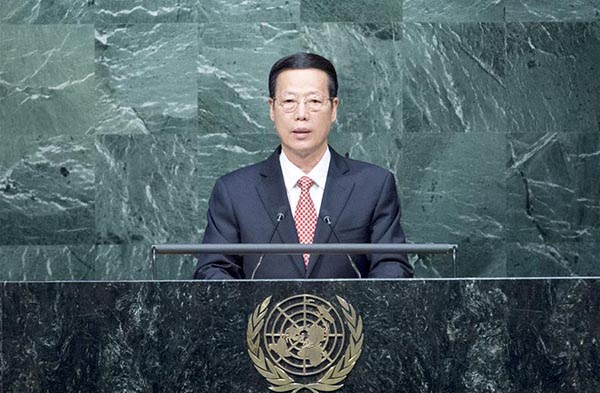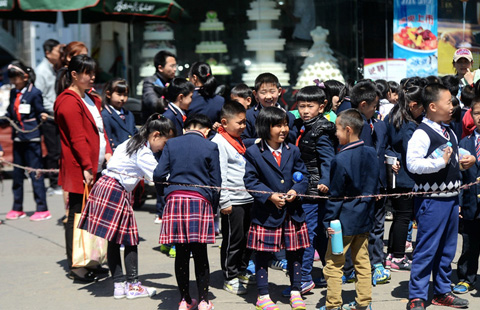China signs Paris Agreement on climate change
(Xinhua) Updated: 2016-04-23 18:33
 |
|
Zhang Gaoli, Chinese vice premier and special envoy of President Xi Jinping, delivers a speech at the opening ceremony of the High-Level Event for the Signature of the Paris Agreement at the United Nations headquarters in New York April 22, 2016. [Photo/Xinhua] |
China signed the Paris Agreement on climate change here on Friday, giving a strong push to the international efforts against global warming.
Around 11:16 a.m. local time (1516 GMT), Chinese Vice Premier Zhang Gaoli, the special envoy of Chinese President Xi Jinping, ascended the podium in the UN General Assembly Hall to sign the thick and weighty document.
"The Chinese people honor our commitments. We will work hard to earnestly implement the Paris Agreement," said Zhang while addressing the signing ceremony earlier.
A total of 175 countries inked the agreement on the first day of its opening for signature, a new record in the United Nations' 70-year history. China was the 21st to sign, while the whole signing process lasted some 2.5 hours.
"Today you are signing a new covenant with the future," UN Secretary-general Ban Ki-moon told the world leaders and government representatives present. The UN has picked the April 22 Earth Day for the event to highlight its significance.
On Dec. 12, 2015, after nearly two weeks of hard bargaining, climate negotiators of 196 parties to the UN conference on climate change in Paris sealed the pact, aiming to reverse the trend of temperature rises mainly caused by carbon emissions. Experts said that China helped resolve several thorny issues to bring about some key breakthroughs.
After the signing, the Paris Agreement still needs 55 nations that together account for 55 percent of global greenhouse gas emissions to ratify before it can enter into force.
Zhang also announced on Friday that China aims to finalize domestic legal procedures to ratify the pact before the G20 Hangzhou summit in September this year, which Ban called a "great news."
"China has played an extremely constructive leadership role," Selwin Hart, director of the Secretary-General's Climate Change Support Team, told Xinhua in a recent interview. "The ambition level of the Paris Agreement would not have been possible were not for China."
To fulfill its commitment to the Paris climate pact, China would have to cut its carbon emissions per unit of GDP by 60-65 percent by 2030 from 2005 levels, increase non-fossil fuel sources in primary energy consumption to about 20 percent, and peak its carbon emissions by 2030.
These targets were reflected in China's intended national determined contribution and also in its 13th Five-Year Plan (2016-2020).
Meanwhile, China furthers its South-South cooperation, a mechanism to promote trade and collaboration among developing countries, and reaches out to developed ones.
Expert have noted that China and the United States have signed four joint statements on climate change, with the latest issued in March on the sidelines of the Nuclear Security Summit in Washington D.C..
"I believed it is important for the world's two largest economies to work very closely in post-Paris implementation phase," Hart said. "We will need their leadership to resolve some of the technical issues and encourage other countries to join and ratify the Paris Agreement."
As the world witnessed the warmest winter in 2015, many believed it has become imperative for the international community to take concerted action to address the climate challenge.
"We are in a race against time ... We must intensify efforts to decarbonize our economies," Ban told the gathering at the signature ceremony.
As the signing of the pact was underway, a group of environment activists were staging a live show titled "Dying" on the roadside near the UN headquarters.
"We are in the emergency. We need to push on harder," said Margaret Klein Salamon, organizer of the event and founder of the Climate Mobilization.
Experts said that real commitments by major powers like China would greatly raise the expectations for an early start of the pact, before the original deadline of 2020.
"I think the Paris agreement will enter into force very very soon," said Jeffrey Sachs, director of the Earth Institute at Columbia University.
- Chinese scientists modify gene to make humans immune to HIV
- Premier underlines peaceful settlement of boundary issues with India
- Hospitals add beds for maternity boom
- Chinese Academy of Sciences tops global science institutions
- China plans to launch core module of space station
- Xi urges stronger PLA
- Charities rebuild image through relief efforts
- Self-testing to boost HIV battle
- Study finds plummeting levels of physical activity among Chinese adults
- School not at fault, its principal insists








